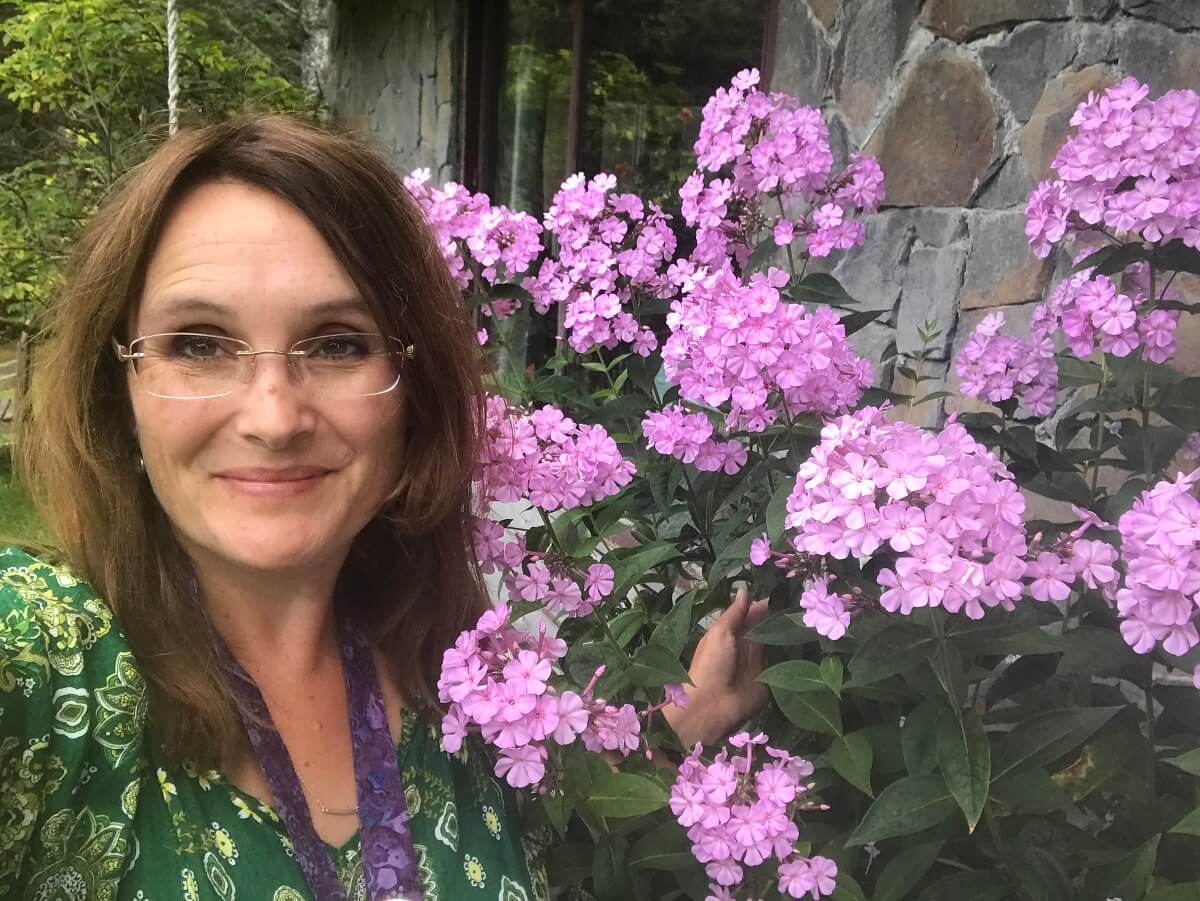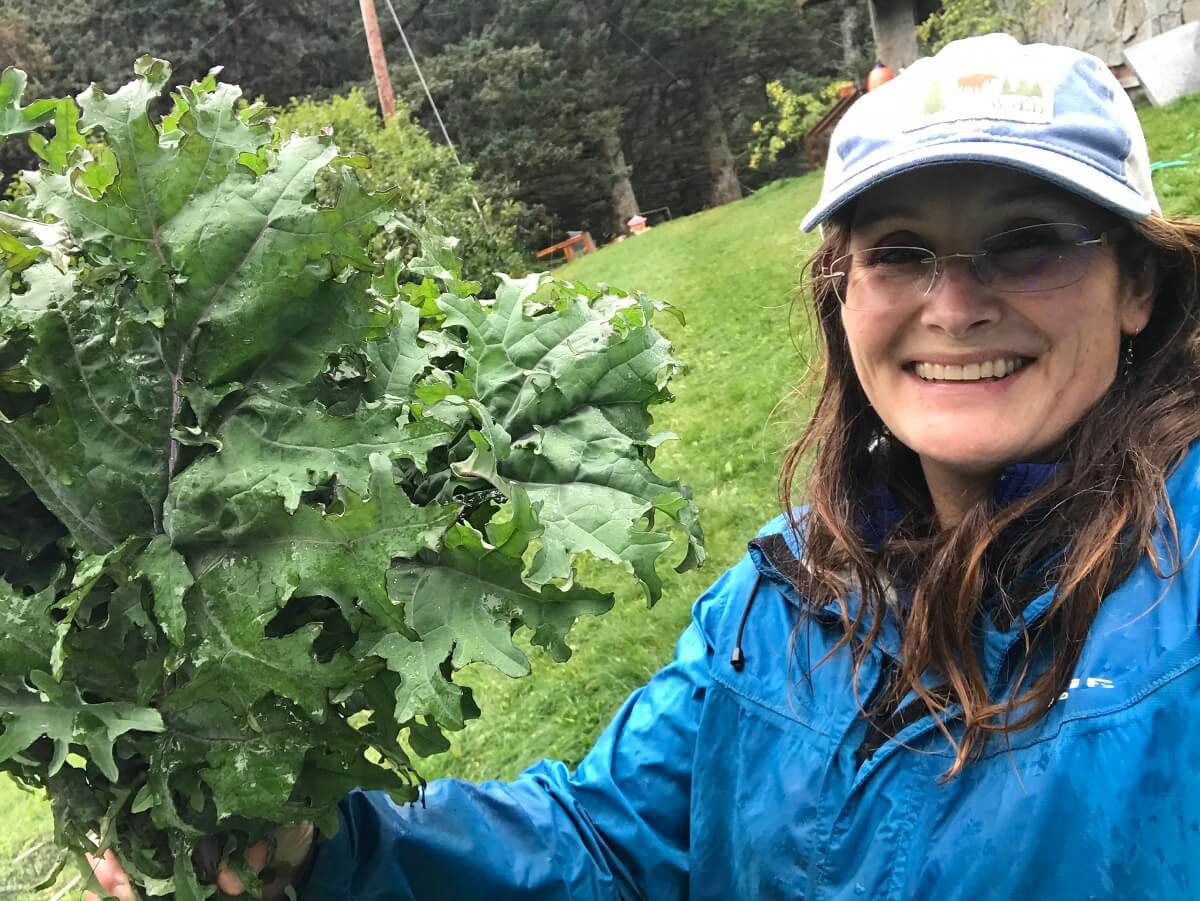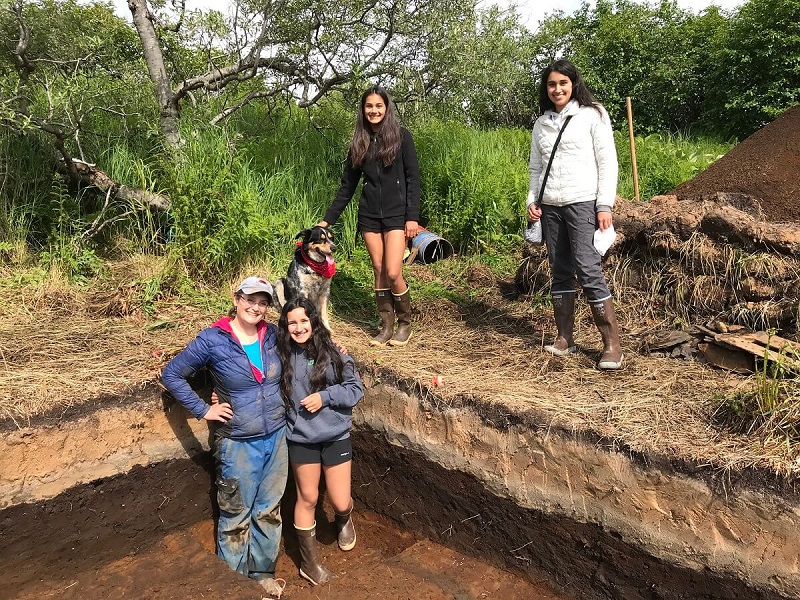Libby Eufemio
Libby Eufemio, Assistant Professor of Alaska Native Studies and Department Head of
the Alutiiq Studies Program at Kodiak College, grew up in a one-room log cabin in
Goldstream Valley. Their home in Fairbanks was on 40 acres at the very end of a long
dirt road, with no running water or telephone, and with very few neighbors, so she
spent a lot of time exploring and playing outside with her brother. Maybe that’s why “being outside with a purpose,”
is still her favorite thing to be doing, whether that’s working in her garden or at
an archeology dig around Kodiak Island.
“I love doing archaeology – being outside, having fun with colleagues, excavating by hand and using my body (instead of sitting at a desk), thinking about the story of the people who were living and working at the site, and holding the tools and objects that they held and used,” she says.
“Sometimes the weather is so awful, you think ‘I’m not going out there,’ but if you have to go out there and dig, you get on your layers and your raingear, and do it. Sometimes there’s cool wildlife. Sometimes we get to work outside of the road system. Camping is not that comfortable sometimes, but when you go for a job, everything about it is wonderful.”
Libby has worked on multiple sites around the island, including remote digs like at Kiliuda Bay, and she draws a lot of teaching inspiration from those experiences.
“We get to bounce ideas back and forth, and things change as you’re digging down, and the stories change and get richer as you get more information.”
Archeology is what first brought her to Kodiak. She stayed because “Kodiak is the
perfect sized town! Not too big, not too small.” She loves “the beautiful ocean and
beaches and mountains and weather and the people.” She started her career at the Alutiiq
Museum here after graduating from UAF with a BS & MA in Anthropology with a focus in archaeology.
She spent a decade at the museum.
“It was a fantastic job because I got to do archeology and work with artifacts in new ways, in preserving them, because Kodiak has amazing sites with organic preservation. Where I’m from in the Interior, we’d just find chips, stone tools, little bits of bone. We’d never find whole sites of wood and braided grass mat fragments and pieces of pottery and ancient haircuts and all of these wonderful midden, with all the stuff they were eating at different times of the year. It’s really rich here archaeologically. I got to learn how to preserve all these wonderful objects that were coming out of the ground–wood and bone and ivory. I got to learn on the job. It was fantastic.”
She also worked as the educational outreach coordinator with kids and visiting tours, and worked on displays and exhibits.
“I got to meet these wonderful elders and go to villages and participate in culture camps. It was a wonderful job,” she says.
She took time off to raise her three girls, and says it was when she started teaching anthropology as an adjunct at Kodiak College that she realized, “This is what I was meant to do, is to teach.”
“I like reading, learning and sharing – which turn out to be perfect things for this job.”
A newly published book that she recommends is Origin: A Genetic History of the Americas, by Jennifer Raff. “I like it because it blends things together that I love— history, science, genetics, archaeology, all wrapped up in a good, readable story!”
Her “comfort reads” include Jane Austen’s Persuasion and Pride & Prejudice, anything by LM Montgomery, and the Master & Commander series by Patrick O’Brien which she’s read twice (which is impressive because the series is over 20 books long).
 Stories are an important element of Libby’s classes, whether she’s teaching Anthropology
or an Alaska Native Studies course.
Stories are an important element of Libby’s classes, whether she’s teaching Anthropology
or an Alaska Native Studies course.
“You can have abstract concepts, but if you can attach them to an actual story they’re easier to remember and understand. I like to use a lot of pictures and a lot of beautiful colors as I’m talking about things. I hope that’s inspiring. I like learning through reading, and color. I’m a visual learner. If I can see a picture, that really helps.”
She also values learning her students’ stories and finding out what they’re interested in. She makes a point to have at least one conference with all of her students.
“I like finding ways to help them learn things they might not have known, and helping them find resources to help them achieve their goals. Last semester I met with over 90 percent of my asynchronous students, to make the class relevant to their areas of study. Establishing relationships is what I like to try to do.”
“I love hearing from students. Reach out, ask questions. I don’t mind. I love it. I want to have that discussion or discourse with you. What are your questions? What didn’t I make clear enough? What’s going on in your life? How are you feeling? That all ends up being important in how they’re going to succeed.”
“I’m always trying to tweak classes that I’ve taught on a regular basis, so they get better.”
Libby says that she’s most proud of her girls and her students. She also takes pride in her garden. There may still be snow on the ground, but she’s already daydreaming about the summer growing season.
“Gardening has been my passion, and my go-to thing when I shut my eyes and think of something nice. All winter I think about gardening and growing things and making compost! I’m getting better at it, I’ve learned from my Mom. We always had a garden when I was growing up, and when my parents moved here my mom and I gardened together—now I’m the head food gardener and she is my mentor.”
Libby has eight raised beds, some containers, a tiny greenhouse & porch plants. She’s planning to build a 3 bay compost bin and clean out the greenhouse that once doubled as chicken coop. She loves animals and over the years has raised chickens and ducks and rabbits and horses and goats. She often volunteers with Kodiak 4-H.
“This year my goals are to grow more food in succession. Old favorites are broccoli, carrots, radish, kale, chard, peas, potatoes, turnips, but this year I’m going to
try a few new varieties, and work on taking better care of everything & eating something
from the garden every day.”
carrots, radish, kale, chard, peas, potatoes, turnips, but this year I’m going to
try a few new varieties, and work on taking better care of everything & eating something
from the garden every day.”
“Now that I don’t have chickens in it, my greenhouse will actually house some tomatoes, zucchini, and cucumbers,” she says. “Mainly though, my greenhouse will house a cozy seating area in among the vines so that my mom and I can sit in it on blustery days and enjoy that lovely greenhouse feeling! I really like to have family time. To eat together and hang out together.”
This summer she also plans to do lots of beach and mountain hiking with her daughters and Hugo, their new puppy.
Her love for growing food ties right into her current PhD program, which focuses on food security and food sovereignty, and finding out what kinds of educational opportunities are needed to make food ventures in our rural villages successful.
“What are the skills that people wished they had before they started their community garden,” she asks, “That’s what I’m interested in–gardening, food, I love eating local food like salmon and elk and deer. And there’s this ancient healthy relationship with the land and with all the things you can eat and use on the land and we’ve gotten away from that, as western society, we use up the landscape and resources. Here we have thousands of years of really high density populations using the landscape and when the Russians arrived there was an abundance. The Alutiiq people had a beautiful relationship with the natural environment and I’d like to weave that history into the story somehow.”
April is Alaska Archaeology Month, and this spring Libby has cause for extra celebration because she has four soon-to-be graduates from The Alutiiq Studies Program.
“They’re wonderful students, they’ve been working really hard. It’s hard to take a
4 credit language course, it’s a lot of work  when you have family and other jobs and other responsibilities. Very few of my students
are ever traditional students right out of high school, they’re all people of any
age who are working or taking care of siblings, kids, or parents, fitting school in
around all those other things.”
when you have family and other jobs and other responsibilities. Very few of my students
are ever traditional students right out of high school, they’re all people of any
age who are working or taking care of siblings, kids, or parents, fitting school in
around all those other things.”
“Kodiak College is a hidden gem, in that a lot of people don’t know all that we offer, or that we can tailor something for them,” she says, “Like Alutiiq language, people are starting to sign up for it from all over the country, people who want to reconnect to their language and culture.”
“Folks are really invested in language revitalization and reclamation—where words become more commonly used in our community. Like “Cama'i,” using it is a habit for me now. It should feel normal and comfortable here, that would be wonderful it that was something that happened here.”
